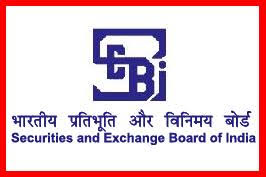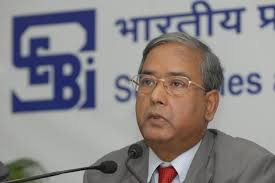Sebi orders closer scrutiny of corporate disclosure:

India’s capital market regulator Sebi on Monday ordered stock exchanges to step up monitoring of disclosures by listed companies in an attempt to improve corporate governance standards and enhance investor protection.


 Exchanges will be required to follow up with the listed
firms at every stage for updates on material events reported. And in
case there is any discrepancy in the information, they have to seek
clarification from a company within two working days of the disclosure.
Exchanges will have to report to Sebi regularly about actions taken by
them against non-compliant companies.
Exchanges will be required to follow up with the listed
firms at every stage for updates on material events reported. And in
case there is any discrepancy in the information, they have to seek
clarification from a company within two working days of the disclosure.
Exchanges will have to report to Sebi regularly about actions taken by
them against non-compliant companies.
Read more at:
http://economictimes.indiatimes.com/articleshow/26082567.cms?utm_source=contentofinterest&utm_medium=text&utm_campaign=cppst
Read more at:
http://economictimes.indiatimes.com/articleshow/26082567.cms?utm_source=contentofinterest&utm_medium=text&utm_campaign=cppst
India’s capital market regulator Sebi on Monday ordered stock exchanges to step up monitoring of disclosures by listed companies in an attempt to improve corporate governance standards and enhance investor protection.
The Securities and Exchange Board of India (Sebi) ordered the
exchanges to closely scrutinize compliance by companies with their
listing agreements and corporate governance norms and act swiftly to
deal with any violations.
Sebi chairman U. K. Sinha
on Friday indicated that the regulator was putting in place more
stringent disclosure standards for listed firms to ensure that investors
are able to take prudent decisions based on information revealed by
them to the exchanges.
The market watchdog acted after it found as many as 1,100
listed firms to be
non-compliant with their listing agreements and as
many as 900 to be deviating from corporate governance rules.
These norms
relate to shareholding pattern, public and promoter ownership,
procedures of share transactions, filing of financial results and
price-sensitive information, corporate governance and so on.
Sebi directed the stock exchanges to monitor disclosures
by publicly traded firms by comparing them with their filings in the
previous quarter. Such a comparison will include changes with regard to
the promoters, their shareholding, encumbered shares, persons holding
more than the required percentage in public investors’ category and so
on.
The exchanges have to ensure that all the disclosures
made are in compliance with Sebi’s insider trading and takeover rules as
well.
In order to enable the exchange and listed entities to
put in place an adequate infrastructure to ensure compliance with
requirements, stock exchanges were directed to start by monitoring the
disclosures made by the top 500 listed companies (by market
capitalization as on 31 March 2013) in compliance with various clauses
of the listing agreement for the quarter ending 31 December 2013.
Stock exchanges have failed to check violations of clause
49 of the listing agreement by companies, which relates to corporate
governance norms, said Anil Singhvi, co-founder of Institutional Investor Advisory Services India Ltd, a corporate governance research firm.
“They need to set up monitoring cells and also declare
what punitive action needs to be taken in case of violation,” he said.
“Stock exchanges need to improve surveillance and work closely with
Registrar of Companies to achieve this.”
Improved corporate governance is necessary for India to “attract serious capital,” Singhvi said.
Although the latest directive does not make much of a
change in existing capital market norms, the mandated format for
disclosures to be made by listed firms will help curb the scope of
non-compliance by enhancing clarity in disclosures and make companies
pay for non-compliance or delays in compliance.
Sebi found that although listed firms make disclosures to
exchanges within the time frame stipulated under the listing agreement,
the contents of the disclosures are not always adequate and accurate.
Investors are unable to take informed investment decisions based on such
disclosures, Sebi said.
“….It is felt that the current monitoring mechanism of
stock exchanges to ascertain the adequacy and accuracy of disclosures
made in compliance with the listing agreement need to be made more
effective,” the regulator said.
For effective supervision on compliance with the latest
requirements, Sebi directed stock exchanges to form a special cell. They
were asked to augment their workforce, if required, to monitor the
adequacy and accuracy of corporate disclosures and devise a framework
that helps detect any violation of Sebi rules immediately.
In line with this, exchanges will be required to submit
an ‘Exception Report’ with details of companies that were non-compliant
or did not respond to calls by the exchanges for clarifications.
Some experts said Sebi’s directive will be effective only if it is implemented in a phased manner.
“Sebi needs to follow a phased approach to regulation as
it would be more effective and implemented more meaningfully. We should
limit such monitoring for companies which matter for market indices and
only when they set a benchmark should we extend this regulation to other
thinly traded companies,” said N. Venkatram, managing partner, audit, at Deloitte, Haskins and Sells, an audit firm.
The capital market regulator ordered stock exchanges to
initiate actions against non-compliant firms in a time-bound manner to
ensure that listed firms take Sebi seriously when it comes to investor
protection.
Stock exchanges were directed to update themselves with
all media reports appearing about listed firms and ensure that there is
no mismatch with disclosures made by them on exchanges.
Rahul kumar Gupta
PGDM 1 st Year
Sensex, Nifty lackluster; BPCL, ICICI Bank, Cipla, Hindalco down
Read more at:
http://economictimes.indiatimes.com/articleshow/26082567.cms?utm_source=contentofinterest&utm_medium=text&utm_campaign=cppst
MUMBAI: The Nifty was witnessing a lackluster session as the bulls look tired after three-day upmove and in absence of triggers from Asian peers. Gains in realty, power and metals were offset by losses in banks, oil & gas and capital goods sectors.
Read more at:
http://economictimes.indiatimes.com/articleshow/26082567.cms?utm_source=contentofinterest&utm_medium=text&utm_campaign=cppst
No comments:
Post a Comment